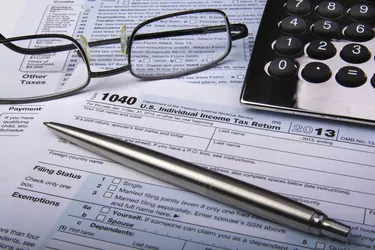
One way to reduce your income tax liability each year is to take all of the deductions available to you. Depending on your personal situation, you might be able to deduct some or all of your rent on your tax return. This will depend on whether you are paying rent for personal living space or for business use.
With the passage of the Tax Cut & Jobs Act, employees can no longer deduct business-related expenses that aren't reimbursed by an employer, points out legal website, NOLO.com. Knowing your rent tax deduction options will help you keep more of your income and avoid making an error on your annual return.
Video of the Day
Video of the Day
Consider also: Non-Employee Compensation: Definition & Compensation Reporting
Non-Business Space Rent
Because homeowners can deduct part of their mortgage interest, renters sometimes become confused as to whether that provision applies to their situations. You cannot take a rent deduction if you're using the space for non-business purposes. For example, if you live in an apartment and do no business there, you can't deduct that rent. If you're renting a storage locker for personal items, you can't take a tax deduction for that rent, either.
Home Office Qualifications
If you have a home office, you can write off the rent related to the square footage of the office in certain circumstances. The space must be used exclusively and regularly for business, or be the main place you meet customers. The only exception is if the space you're renting is not attached to the main residence, such as a guesthouse or second floor of a freestanding garage.
If you have a room that doubles as a workout room and an office, you can't write off that space as a home office unless the room is clearly partitioned and each section is used exclusively for its purpose. The same goes for an office that family members use for business, kids' homework and Internet surfing. The space must also be your principal business work location.
This means that if you have a full-time job at an office downtown, but you come home at night and spend some hours working in a specific room of your apartment or house – even if you only use that room for business work – you can't write it off. Generally, the deduction for home office expense is limited to the net income derived from the home office, which is calculated before the office deduction. The home office cannot create a loss.
Consider also: Guide to Home Office Deductions
Storage and Day Care Deductions
If you store materials or inventory in your apartment, you can claim a deduction if your apartment, or an office in your apartment, is your principal place of business. For example, if you own a restaurant as your principal business and store cans of food and equipment in your apartment, you can't claim that portion of your apartment and the related rent as a deduction.
If you offer daycare out of your apartment or home, you might be able to write off some of the rent even though you use the space for business during the day and as personal living space the rest of the time. You must calculate how much of your rent qualifies for a write-off based on the amount of time you use the space for business.
If you have a home office that qualifies for a deduction, you can also write off a portion of expenses such as utilities, repairs, maintenance, pest control and security related to the office. For example, if your qualifying home office takes up 15 percent of your apartment, you can write off 15 percent of your heat and electric bills.
Visit the Simplified Option for Home Office Deduction page of the IRS website to learn the two different ways you can use to take a home office deduction. You should also review what constitutes a home office and what negates the use of home space for a deduction.